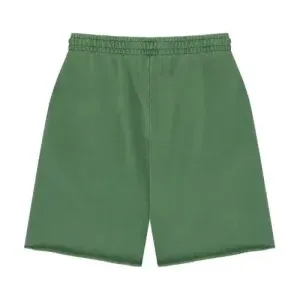
In the ever-evolving world of streetwear, certain brands stand out not only for their creativity but also for their deeper cultural narratives. Denim Tears, the brainchild of Tremaine Emory, has carved its place in fashion by blending style with storytelling. While many labels focus solely on aesthetics, Denim Tears uses its collections as a platform to highlight history, identity, and the African diaspora. Among its standout pieces, Denim Tears shorts have gained significant attention for their unique designs, cultural symbolism, and effortless streetwear appeal. These shorts are more than just clothing—they are wearable statements that bridge fashion and heritage.
The Story Behind Denim Tears
Founded by Tremaine Emory, also known as “The Denim Tears,” the brand was launched with a vision to address themes of race, identity, and history through the medium of fashion. Emory, who has worked with brands like Supreme, Kanye West, and Virgil Abloh, brings a wealth of experience and cultural consciousness to his label. Each piece tells a story, often highlighting overlooked aspects of African-American history. Denim Tears shorts are part of this larger narrative, reflecting both style and substance.
Distinctive Design Language
Denim Tears shorts are instantly recognizable for their artistic approach to design. Often featuring embroidered motifs, printed patterns, or bold graphic elements, these shorts capture attention while delivering comfort. The cotton-based fabrics and precise tailoring ensure functionality, but it’s the designs that set them apart. For example, the signature cotton wreath motif—a recurring theme in Denim Tears pieces—serves as a visual reminder of America’s complicated history with slavery and cotton fields. When featured on shorts, this motif transforms a casual clothing item into a meaningful cultural artifact.
Comfort Meets Contemporary Streetwear
While Denim Tears shorts are embedded with deep symbolism, they don’t compromise on wearability. Crafted with premium fabrics, they provide breathability and durability, making them suitable for both casual wear and styled looks. Whether paired with a graphic tee, oversized hoodie, or even a simple white shirt, these shorts adapt seamlessly to different outfits. Their relaxed fit caters to the modern streetwear aesthetic, which prioritizes both style and comfort.
A Medium of Storytelling
What makes Denim Tears shorts especially appealing is the way they act as a canvas for storytelling. In the streetwear world, clothing often carries subtle messages about identity and belonging, but Denim Tears takes it further by directly engaging with history and social commentary. Wearing a pair of Denim Tears shorts is more than a fashion choice—it’s a statement of awareness, pride, and cultural connection. This is one of the reasons the brand resonates so deeply with those who view fashion as an extension of personal and collective identity.
Influence of Collaborations
Denim Tears is known for its collaborations with major brands and cultural figures, and shorts are often part of these limited-edition drops. Collaborations with giants like Levi’s, Converse, and Dior have elevated the brand to a global platform, bringing its designs to wider audiences. Limited runs of Denim Tears shorts from these collaborations quickly become collector’s items, valued not just for their rarity but for the rich stories they embody. These partnerships highlight how the brand bridges the gap between mainstream fashion and socially conscious design.
Styling Denim Tears Shorts
One of the standout qualities of Denim Tears shorts is their versatility in styling. Streetwear enthusiasts often pair them with sneakers and oversized tees for a laid-back look, while fashion-forward individuals might style them with layered outerwear or statement accessories to create bold outfits. Their ability to transition between casual and elevated looks makes them a wardrobe essential for those who want to blend comfort with cultural relevance.
For instance, a pair of Denim Tears shorts featuring the cotton wreath design can be paired with a simple white tee to let the shorts take center stage, or matched with a Denim Tears graphic hoodie for a coordinated streetwear fit. This adaptability ensures they remain stylish across seasons and trends.
Global Recognition and Cultural Impact
Though rooted in African-American history, Denim Tears have gained popularity worldwide. They resonate with people who appreciate clothing that carries deeper meaning, and they have been worn by celebrities, musicians, and influencers across the globe. In hip-hop culture especially, Denim Tears has become a favorite, reflecting the close ties between music, identity, and streetwear.
Their cultural significance goes beyond just fashion—Denim Tears shorts invite conversations. By wearing them, individuals often find themselves explaining the symbolism behind the designs, turning everyday outfits into opportunities for dialogue about history and heritage.
Exclusivity and Demand
Like many streetwear brands, Denim Tears operates with a model of limited drops. This exclusivity fuels hype around each release, making the shorts highly sought after. Fans often wait eagerly for online drops or pop-up events, knowing that pieces may sell out within minutes. The scarcity adds to the allure, turning Denim Tears shorts into prized possessions that symbolize not just style but also cultural consciousness.
Conclusion: More Than Just Shorts
Denim Tears shorts represent the perfect intersection of fashion, history, and self-expression. They embody Tremaine Emory’s mission to create clothing that sparks awareness while remaining stylish and functional. Every stitch, motif, and design choice carries weight, transforming shorts into a storytelling medium.
For streetwear enthusiasts, owning a pair is not simply about staying fashionable—it’s about aligning with a vision that values culture, identity, and authenticity. In a world where trends come and go, Denim Tears shorts stand as a lasting reminder that fashion has the power to educate, inspire, and connect people across cultures.

